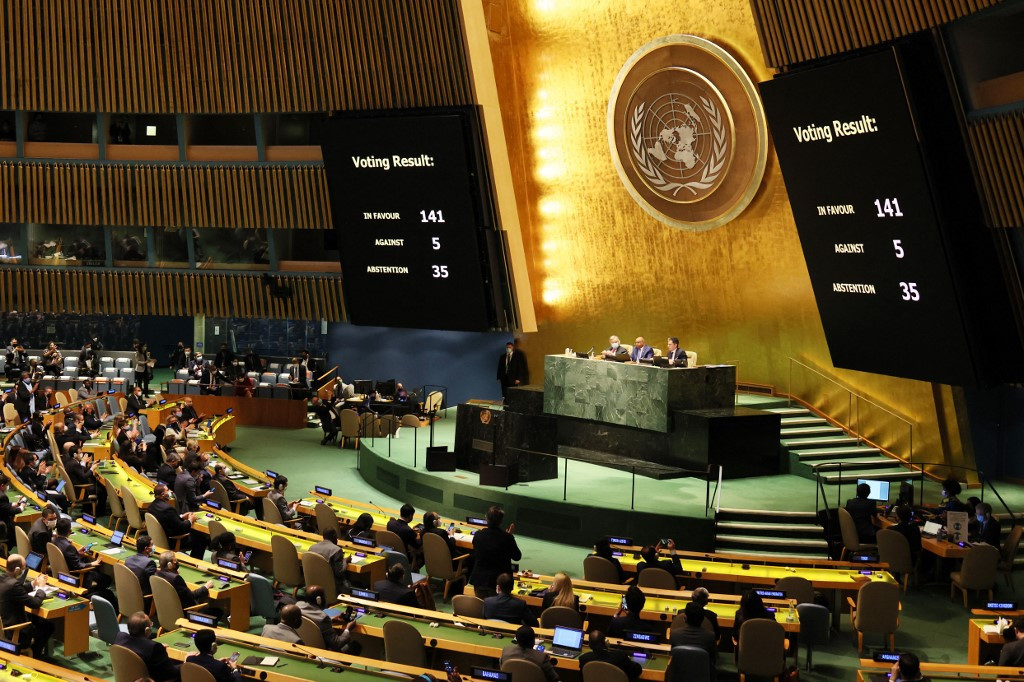Popular Reads
Top Results
Can't find what you're looking for?
View all search resultsPopular Reads
Top Results
Can't find what you're looking for?
View all search resultsUkraine crisis may send ripples through Indo-Pacific, analysts say
Indonesia's envoy to the United Nations said that the international community must go beyond condemnation and start “restoring trust and confidence”, as analysts predict the potential effects of the Ukraine crisis.
Change text size
Gift Premium Articles
to Anyone
M
ore than a week since Russia launched its self-justified invasion of Ukraine, strategic thinkers from Southeast Asia have started to reflect on the potential impact the conflict might have on the periphery, including in the Indo-Pacific.
Russian President Vladimir Putin’s order to conduct a “special military operation” in Ukraine on Feb. 24 has sparked widespread condemnation, including from Russians themselves, but Moscow’s relentless attacks since then have sparked fears that the conflict could have knock-on effects on other parts of the world.
Kishore Mahbubani, the director of the Asian Peace Program at the National University of Singapore (NUS), said that while it was still too early to tell what the outcome of Russia’s invasion would be, a crisis in Europe would definitely have implications in Asia.
“I hope that we would – in our region – realize that whatever we do, if we see a conflict approaching, it’s best to do something proactively to stop it, instead of being passive in the way that the Europeans were in Ukraine,” he told a webinar organized by the Indonesian International Islamic University on Wednesday.
The large-scale attack follows Ukraine’s attempts to gain membership to the North Atlantic Treaty Organization (NATO), which Moscow considers an existential threat.
Analysts consider it a worst-case scenario for the failed efforts to talk the Kremlin down after months of military buildup at Ukraine’s borders.
The invasion has also upended international cooperation, changing the strategic outlook of European countries like Germany, Switzerland, Finland and Sweden, while splitting apart the rest of the world.
Even in responding to Moscow’s aggression collectively at the United Nations, not all countries across Asia were ready to take sides against Russia.
Despite worldwide condemnation via Wednesday’s passage of a UN General Assembly resolution demanding Russia withdraw from Ukraine, 35 nations including India and Pakistan – but also Vietnam and Laos from Southeast Asia – chose to abstain in the vote.
Indonesia, which cosponsored the draft UNGA resolution alongside 95 other countries, voted for it, while Russia rejected it alongside North Korea, Belarus, Syria and Eritrea.
In a statement after the vote, Indonesian Ambassador to the UN Arrmanatha Nasir said that the international community must go beyond condemnation and start “restoring trust and confidence”.
A Chinese equation
For Mahbubani, the main implications of the Ukraine crisis would be felt the most in East Asia, as it relates to the rivalry between the United States and a rising China.
China, he said, may become a loser vis-à-vis the conflict in the short term, but a winner in the long run. In the short-term, the Ukraine crisis may result in a stronger Western alliance, which is against Chinese interests in keeping the European Union independent of US policy.
“On the other hand, if the US and Europe actually remain bogged down in Ukraine, [...] that might be a plus point for China, because while the West is focusing on Russia, China will keep growing,” he said.
Beijing has been the subject of antagonization by the US and its allies, which include neighbors Japan, South Korea and Taiwan, but also India. Some observers have pointed to Taiwan as the next potential geopolitical hotspot.
Another analyst, Charmaine Willoughby from De La Salle University in the Philippines, argued that Putin’s military action had made China’s position even more complicated.
“On one hand is the hope that Russia can one day support China’s territorial aspirations in this part of the world, but on the other hand, China’s alignment with Russia now casts further doubts on the already tarnished Chinese credibility and soft power,” she said at the webinar.
Questions on cooperation
For Southeast Asia, the unpredictability of the Ukraine crisis should also be seen as a real warning sign, said Jusuf Wanandi, the vice chairman of the board of trustees for the Centre for Strategic and International Studies.
“Although it is another part of the world that we have to deal with, it definitely opens our eyes to what could happen in this part of the world,” he said at the webinar on Wednesday. “That is a very critical issue for us and we must not think so lightly and take it for granted.”
In addition to Taiwan, a number of Southeast Asian countries have been at odds with China for decades over territorial boundaries and exclusive rights in the South China Sea. Beijing has made sweeping claims to the resource-rich waters against international law, and has defied critics by building up military assets there.
In an attempt to avoid open conflict, ASEAN has been seeking to draft with China a Code of Conduct (COC) on the South China Sea, which would serve as guidelines for managing and preventing conflict in contested waters.
The Russian invasion may also force Southeast Asian policymakers to rethink conventional beliefs in regional security, including the idea that economic interdependence and the exercise of international law will be enough to prevent conflict, said Evan Laskmana, a senior research fellow at the NUS’ Lee Kuan Yew School of Public Policy.
“It holds important lessons for us, particularly with policymakers who continue to insist that, as long as we have economic interdependence, as long as we have international law on our side, and as long as we have habits of dialogue, we’ll be fine and be spared this type of war,” Evan said.
“That hasn’t really worked out so well.”










